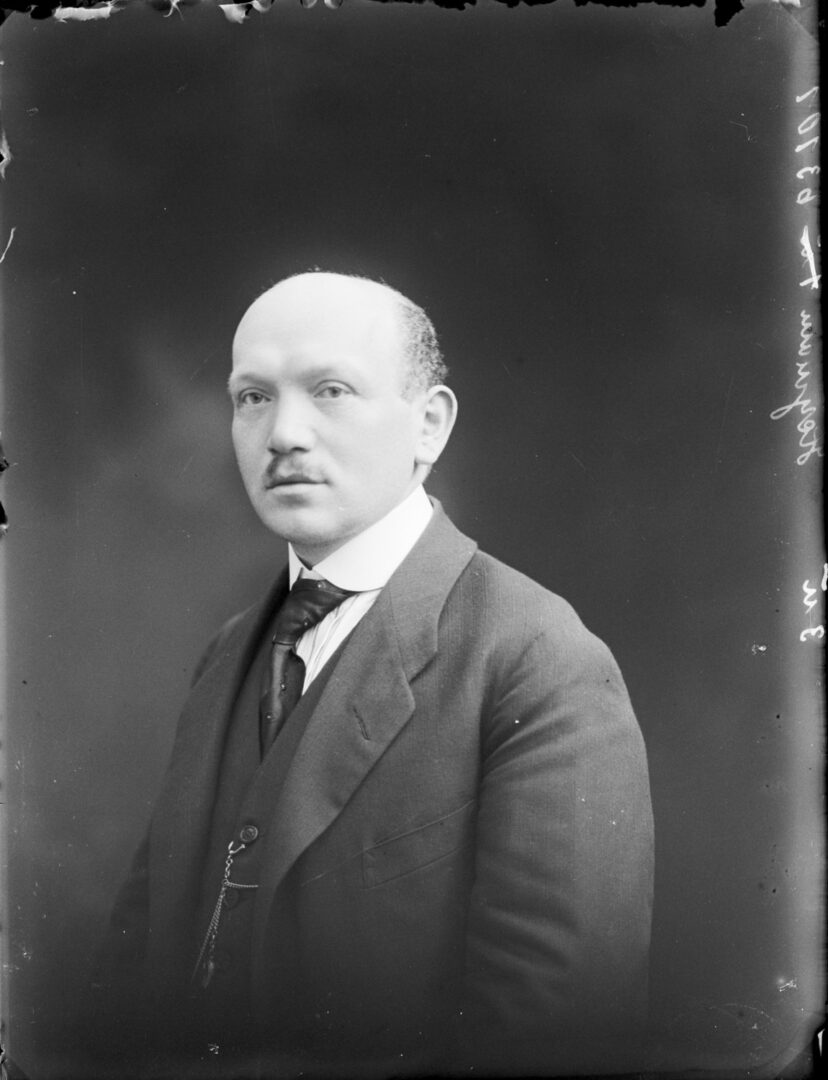The history of the Heymann family
Max Heymann was born on May 27, 1882 in Tauberbischofsheim as the third child of the horse dealer Samuel Heymann and his wife Nanny, née Rosenfeld. On March 19, 1912, he married Eleonore (Ella) Kuhn, who was born on March 14, 1886 as the daughter of Moses and Pauline Kuhn in Haßloch in the Palatinate. Their sons Siegfried (1916) and Walter (1923) were born in Hof.
Max Heymann’s life in Hof began with the purchase of the “Ludwig Schloß” shoe store at Lorenzstraße 7 on October 21, 1912. From 1919, Max Heymann also ran a shoemaking business. For several years, he was the first chairman of the “Association of Shoe Retailers in Hof and the surrounding area”. In the 1920s, he was a member of the welfare committee of the Hof District Welfare Association. According to Hans Högn, Mayor of Hof from 1950 to 1970, Max Heymann was always a friendly and helpful man whose business suffered from the hostility of the National Socialists early on. Högn reports of Nazi slogans in the shop window such as “Don’t buy from Jews!” or “Jews are our misfortune” and of SA men outside the store door accosting customers. In 1933, the business went into decline and Max Heymann filed for bankruptcy. In December 1934, Max and Ella Heymann were forced to close and sell the shoemaking business for good, and in January 1936 the shoe shop as well. From 1936 to 1938, Ella Heymann had registered a goods agency. On December 1, 1937, Max Heymann and his family moved into the attic apartment of the synagogue building at Hallstraße 9, where he worked as a synagogue servant. A year earlier, on December 23, 1936, Max’s son Siegfried Heymann had emigrated to New York with less than $50. During the Reich Pogrom Night, the Heymann family was arrested after their home was demolished. After the destruction of the synagogue, they moved into the Reiter family’s apartment at Ludwigstraße 54. In 1939, they moved to Mannheim to a so-called “Jews‘ house”, where Max’s wife Ella’s sister Elisabeth Stern, her husband Wilhelm Stern and their daughter Lore also lived.
The Heymann family was deported to the Gurs internment camp in the south of France as part of the so-called Wagner-Bürckel campaign on October 22 and 23, 1940. The action, named after two Gauleiters of the region and carried out by Heinrich Himmler, was the forerunner of the mass deportations to the East. Its aim was to deport Jews from south-west Germany to southern France, with the exception of those who were very ill or married to non-Jews. Following protests by the Vichy government, the government of southern France, which was not occupied by Germany but collaborated with Germany, no further transports took place at first. A total of around 6,500 Jews were deported to Gurs. The situation there was very bad, as there was not enough water and hunger was a constant companion. Ultimately, these conditions encouraged the spread of diseases such as typhus and dysentery, which led to the death of around 800 prisoners in the winter of 1940/41. Further camps were set up to which the Jewish prisoners were distributed. Max Heymann died in the Nexon internment camp on November 29, 1942, aged around 60. His son Walter was later transported to the Les Milles camp, where the prisoners were subjected to forced labor and mistreatment. Germany’s pressure on France to cooperate in the persecution and extermination of the Jews increased. A central collection and internment camp, whose organization and structure corresponded to that of other concentration camps, was set up in Drancy in August 1941, where Walter Heymann and his aunt Elisabeth Stern were also interned. From June 22, 1942, around 65,000 Jews were deported from there to Auschwitz or Sobibor, Walter Heymann and his aunt in August 1942. Walter Heymann died in Auschwitz on December 21, 1943 at the age of 20. His mother Ella Heymann was liberated by Allied forces together with other Jews in the Masseube camp. She emigrated to the USA, where she reunited with her son Siegfried, her husband’s family and other families from Hof.


